當(dāng)前位置: Language Tips> 雙語新聞
Selfie obsessed? Astonishing image shows entire crowd with backs turned to snap perfect picture of themselves with Hillary Clinton
分享到
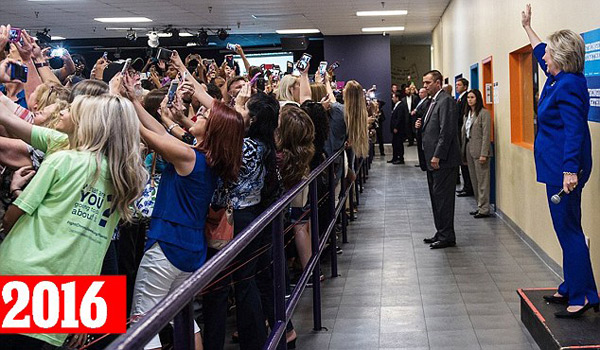
It's a picture which perfectly captures our obsession with the selfie.
這張照片完美地捕捉到了我們對于自拍的癡迷。
Taken at an Orlando campaign event, it shows Hillary Clinton smiling and waving at a crowd who have their back turned on her. In each of her supporters' hands is a camera ready to snap the perfect selfie with the presidential candidate.
照片攝于奧蘭多的競選活動(dòng)上,如照片所示,希拉里?克林頓笑著向人們揮手,而她的支持者都背對著她,人手一部智能手機(jī),隨時(shí)捕捉與這位總統(tǒng)候選人的完美自拍。
The photo has already been retweeted more than 20,000 times since it was posted to Twitter by a campaign staffer on Sunday.
競選團(tuán)隊(duì)的一名工作人員上周日將這張照片上傳到Twitter上,現(xiàn)在已被轉(zhuǎn)發(fā)了20000多次。
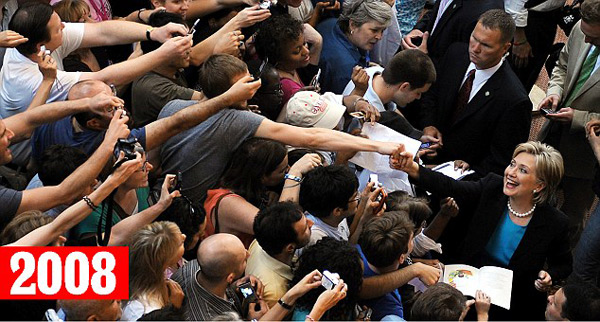
The striking difference can be seen in a campaign photo from 2008 where the crowd is seen reaching out to Clinton, wanting a handshake, an autograph or a photo of the Democrat.
與之形成鮮明對比的是2008年競選活動(dòng)上拍攝的照片,那時(shí),支持者們爭相把手伸向希拉里,希望能和她握手,得到這位民主黨人的照片或簽名。
In Sunday's shot, the crowd was turned away, leaving Hillary a lonely figure, stood on a pedestal and separated by a railing. Everyone in crowd wanted a picture, but they wanted to make sure they were in it too.
而周日拍攝的這張照片中,支持者們隔著欄桿,背對希拉里,留她一個(gè)人孤獨(dú)地站在臺(tái)上。每個(gè)人都想要照片,但更想確保自己能被拍上。
People have been quick to respond on social media, some complaining it summed up the 'narcissistic' generation while others denounced it as 'hilariously sad.'
這張照片一上傳便在社交媒體上引發(fā)了熱議,有些人將其歸結(jié)為這代人“自戀”的鐵證,也有人直接稱其為“滑稽背后的悲哀”。
Yet Clinton has been quick to embrace the selfie culture, posing for pictures with fans and celebrities alike.
不過希拉里很快融入到了這種自拍文化中,她會(huì)與粉絲和名人一起自拍。
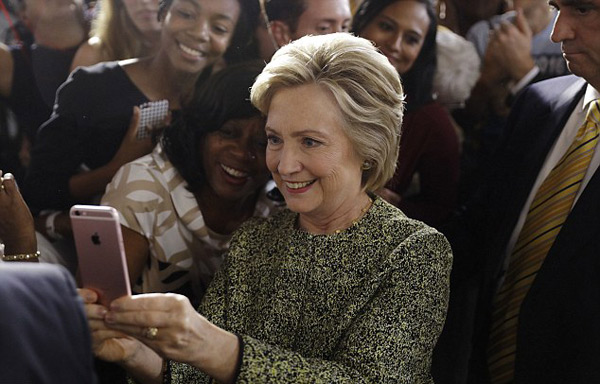
She had previously talked about the impact it has had on campaigning.
她之前也談到過自拍對于競選的影響。
'It used to be, you know, when I campaigned, not just for my husband, but for other people as well, and even back in the '08 campaign, you would finish an event and you would shake hands,' she told Ellen DeGeneres.
她告訴艾倫?德杰尼勒斯:“你知道的,我以前競選過,不只是為了我丈夫,也為了其他人。甚至2008年時(shí),演講結(jié)束后你還會(huì)跟觀眾握手。”
She said supporters no longer wanted a handshake, or even to share their personal stories. Today, it is all about the selfie.
但是現(xiàn)在支持者們想要的不再是握手,或分享自己的故事。如今,他們只想自拍。
In this case, Clinton suggested the idea of the group selfie herself, telling the crowd that anyone who wanted the picture to 'turn around right now.'
這次是希拉里提出的集體和她自拍的點(diǎn)子,她告訴支持者,想和她自拍的“現(xiàn)在就轉(zhuǎn)過去”。
Of course, Clinton isn't the only presidential candidate to get it on the selfie trend.
當(dāng)然,希拉里并不是唯一一位緊隨自拍潮流的總統(tǒng)候選人。
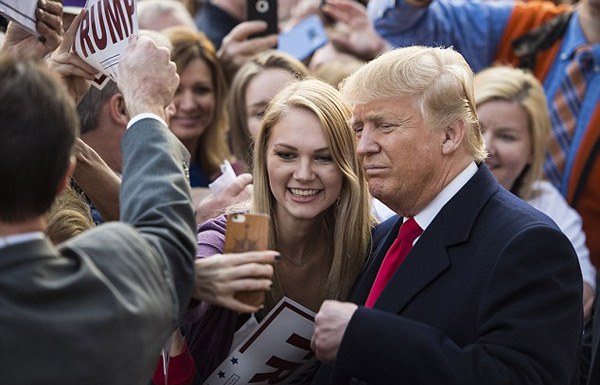
Republican rival Donald Trump has also embraced the phenomenon, and has been pictured posing with his supporters at various events.
她的對手、共和黨候選人唐納德?特朗普同樣接受了這種現(xiàn)象,并在各大活動(dòng)上與支持者一起自拍。
But Clinton is miles ahead in the selfie stakes, having posed for pictures with the likes of Katy Perry, Kim Kardashian and Jimmy Kimmel.
但在這方面,希拉里顯然遠(yuǎn)遠(yuǎn)領(lǐng)先于特朗普,她和凱蒂?派瑞、金?卡戴珊、吉米?坎摩爾等人都自拍過。
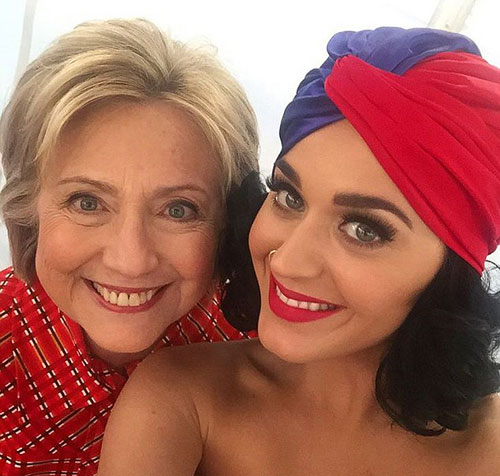

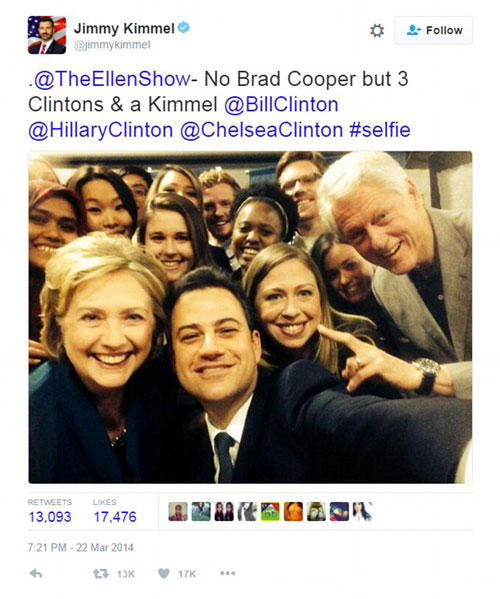
英文來源:每日郵報(bào)
翻譯:秦悅(中國日報(bào)網(wǎng)愛新聞iNews譯者)
審校&編輯:丹妮
上一篇 : 駕車不看手機(jī) App請喝咖啡
下一篇 : 喬治小王子拒絕加總理擊掌
分享到
關(guān)注和訂閱


關(guān)于我們 | 聯(lián)系方式 | 招聘信息
電話:8610-84883645
傳真:8610-84883500
Email: languagetips@chinadaily.com.cn